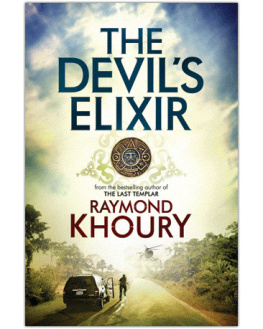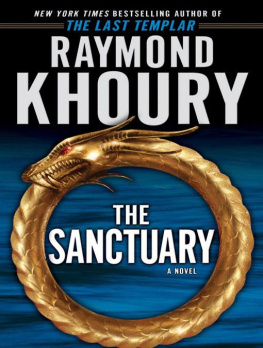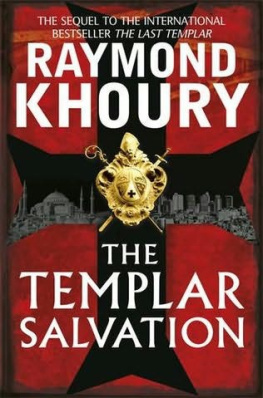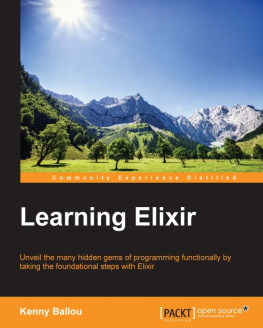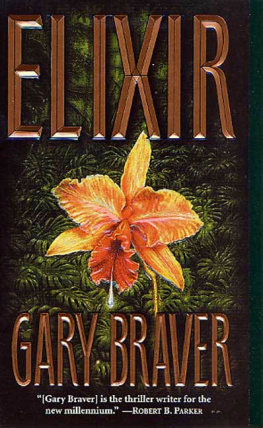ALSO B RAYMOND KHOURY
The Last Templar
The Sanctuary
The Sign
The Templar Salvation
ABOUT THE AUTHOR
RAYMOND KHOURY is the author of four consecutive New York Times bestsellers: his debut, The Last Templar; The Sanctuary; The Sign; and The Templar Salvation. His books have been translated into more than forty languages. To find out more about his work, visit his website at www.raymondkhoury.com, or join him on his official Facebook fan page.
ALSO B RAYMOND KHOURY
The Last Templar
The Sanctuary
The Sign
The Templar Salvation
I
DURANGO, VICEROYALTY OF NEW SPAIN
(PRESENT-DAY MEXICO)
1741
lvaro de Padilla was overcome by dread as his visions dissipated and focus returned to his tired eyes.
The Jesuit priest wondered what world he was emerging into, the uncertainty of it both terrifying and, oddly, exhilarating. He could hear his throat straining against his ragged breaths and feel his strained heart pounding in his temples, and he tried to calm himself. Then his surroundings slowly took shape again and placated his spirits. He could feel the straw of the mat under his fingers, confirming to him that he was back from his journey.
He felt something odd on his cheeks and reached up to touch them, only to realize they were moist with tears. Then he realized his back was also wet, as if hed been lying not on a dry bed, but in a puddle of water. He wondered why that was. He thought perhaps he had drenched the back of his cassock with sweat, but then he realized his thighs and his legs were also soaked, and he wasnt sure it was sweat anymore.
He couldnt make sense of what had just happened to him.
He tried to sit up, but felt all the strength had been drained out of his body. His head was barely off the mat when it turned to lead, and he had to recline, dropping back onto the straw bedding.
Stay rested, Eusebio de Salvatierra told him. Your mind and your body need time to recover.
lvaro shut his eyes, but he couldnt shut away the shock that was coursing through him.
He wouldnt have believed it if he hadnt experienced it himself. But he just had, and it was unnerving, terrifying, and... astounding. Part of him was scared to even think about it, while another was desperate to relive it, now, immediately, to venture back into the impossible. But the harsh, disciplined part of him was quick to stomp out that insane notion and set him back on the righteous path to which he had dedicated his life.
He looked at Eusebio. His fellow priest was smiling at him, his face an edifice of tranquility.
Ill come back in an hour or two, when youve regained some strength. He gave him a slight bob of encouragement. You did very well for a first time, old friend. Very well indeed.
lvaro felt the fear seep back into him. What have you done to me?
Eusebio studied him through beatific eyes, then his forehead wrinkled with thought. Im afraid I may have opened a door that youll never be able to close.
It had been well over a decade since theyd traveled here, to Nueva Espaathe New Spaintogether, ordained priests of the Society of Jesus, sent by their elders in Castile to continue what was by now a long tradition of establishing missions in uncharted territories in order to save the wretched, indigenous souls from their dark idolatry and their wicked, pagan ways.
Their task was challenging, but not unprecedented. Following on the heels of the Conquistadors, Franciscan, Dominican, and Jesuit missionaries had been venturing into the New World for more than two hundred years, and after many wars and uprisings, many indigenous tribes had been subdued by their colonizers and assimilated into the Spanish and mixed-blood mestizo cultures. But there was still a lot of work to do, and many tribes to convert.
With the help of early converts, lvaro and Eusebio built their mission in a lush, forested valley deep in the folds of the Sierra Madre Occidental, in the heartland of the Wixritari people. With time, the mission grew. More and more small communities that had been living in isolation throughout the wild mountains and canyons joined them in their congregacin. The priests formed a strong bond with their people, and together lvaro and Eusebio had baptized thousands of natives. Unlike Franciscan reductions, where the Indians were expected to adopt European lifestyles and values, the two priests followed the Jesuit tradition of letting the Indians retain many of their precolonial cultural practices. They also taught them how to use the plow and the axe and introduced them to irrigation, new crops, and domesticated animals, all of which dramatically improved their subsistence farming lifestyle and earned their gratitude and respect.
It also helped that, unlike the more rigid and exemplary lvaro, Eusebio was a warm, gregarious man. His naked feet and humble attire had inspired the natives to refer to him as Motoliana, which meant the poor man, and, against lvaros advice, hed embraced the name. His humility, his exemplary life, and his thoughtful conversation, all of which were illustrative of the principles he preached, greatly inspired the natives. He also soon developed a reputation as a miracle worker.
It began when, during a drought that threatened to annihilate the natives approaching harvests, he recommended that they form a solemn procession to the missions church, complete with prayers and vigorous flagellations. Copious rains soon relieved the locals of their fears and turned the season uncommonly fruitful. The miracle was repeated a couple of years later, when the region was suffering from excessive rains. By a similar remedy, that blight was checked, and Eusebios reputation grew. And with it, doors gradually opened.
Doors that might have been better kept shut.
As the initially guarded natives started opening up to him, Eusebio found himself drawn into their worlds more deeply. What had begun as a mission to convert turned into an open-minded journey of discovery. He began to take trips deep into the forests and canyons of the forbidding mountains, venturing where no European had gone before, meeting tribes that usually welcomed strangers with the tip of an arrow or the edge of a spear.
He never returned from his last trip.
Almost a year after hed disappeared, lvaro, fearing the worst, set off with a small contingent of tribesmen to find his lost friend.
Which is why they were here now, sitting around a small fire outside the tribes thatched xirixithe ancestral house of Goddiscussing the impossible.
It seems to me that youve rather turned into their high priest, or am I mistaken?
lvaro was still shaken by his experience, and although the food had restored some strength to his limbs and the fire had warmed him up and dried his cassock, he was still highly agitated.
Theyve shown me more than I can possibly show them, Eusebio replied.
lvaros eyes widened with shock. Butmy God, youre embracing their methods, their blasphemous ideas. He looked scared, and he leaned in, his brow crowding his eyes. Listen to me, Eusebio. You must end this madness now. You must leave this place and come back to the mission with me.
Eusebio looked at his friend and felt his spirits sink. Yes, he was happy to see his old friend, and he was delighted to have shared his discovery with him. But he found himself wondering if he hadnt made a huge mistake.
Im sorry, but I cant, Eusebio told him, calmly. Not yet.

